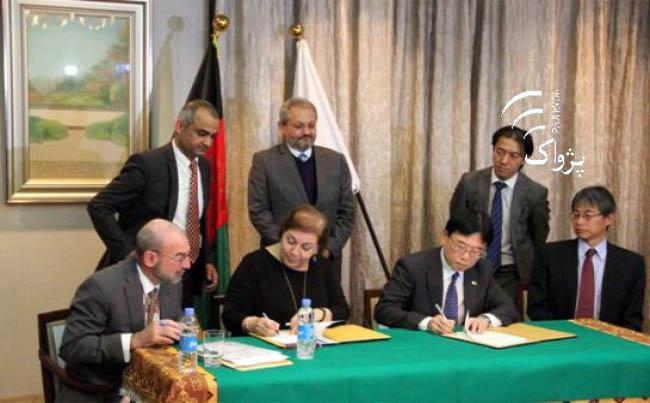KABUL - Japan announced $17.7 million for life-saving vaccines for children and promoting rural development in border areas of Afghanistan under an agreement signed on Monday.
The relevant agreements was signed at the Embassy of Japan in Kabul on Monday between Mitsuji Suzuka, Ambassador of Japan, Takeshi Watanabe, JICA Chief Representative, Adele Khodr, UNICEF Representative and Jocelyn Mason, UNDP Country Director ad interim.
The ceremony was attended Ferozudin Feroz, Minister of Public Health, MrMukhtar Ghafarzoy, Representative of Ministry of Rural Rehabilitation and Development and Sharofiddin Imom, Ambassador of Tajikistan.
Japan announced the new projects to help eradicate polio and prevent the spread of other deceases in Afghanistan and to improve the livelihood in Tajik-Afghan cross-border areas for improvement of self-reliance and stability of the region.
According to a joint statement, the projects approximately worth 8.6 million USD and 9.1 million USD, respectively, will help to procure the vaccines to protect 10.3 million children against polio, reach 1.37 million children with routine immunization and 2.5 million women of child bearing age in Afghanistan, and improve the livelihood of 1.8 million people living in border districts in Tajikistan and Afghanistan.
In the UNICEF’s Project “Infectious Diseases Prevention for Children in the Islamic Republic of Afghanistan” (USD 8.6m), the contribution from the people of Japan will be used to procure routine vaccines for an annual cohort of some 1.37 million children under the age of one.
The vaccines include BCG against tuberculosis, Oral Polio Vaccine (OPV) for poliomyelitis, Meals vaccine and Hepatitis B. In addition, some 2.5 million women of child-bearing age will benefit from the purchase of Tetanus Toxoid vaccine.
These vaccines will be available for free at all health facilities and through the polio campaign.
At the signing ceremony, Dr. Feroz said: “With continued support from the Government of Japan, we have succeeded in ensuring the provision of health services including the immunization services for the children and mothers of Afghanistan.”
The minister assured the Afghan government would maintain focus on routine immunization as one of the key pillars for stopping circulation of the polio virus in Afghanistan.
“We hope that you will continue to keep routine immunization in Afghanistan as one of your top priorities, and I wish to thank you in advance for your future support to the Routine Immunization Programme in Afghanistan”.
UNICEF Representative Ms. Adele Khodr said: “Thanks to Japanese funding over the past 10 years, 11.6 million children and 9.2 million women of child-bearing age have received vaccinations against five vaccine-preventable diseases in Afghanistan.”
Since 2006, she said, Japan’s contribution to polio eradication efforts had supported the immunization of up to 9.5 million children during National Immunization Days, held on average four times a year.
“The world is closer than ever to reaching the goal of a polio-free world but much still needs to be done. This is why we greatly appreciate this sustained funding from the Government of Japan, which is critical to keep up the momentum until every child is immunized and the world is polio-free.”
UNDP’s Project“Livelihood Improvement in Tajik-Afghan Cross-Border Areas (LITACA) Phase II” (USD 9.1 M) will be built on the past achievements of LITACA Phase I, which was also funded by the Government of Japan.
The project aims to improve living standards of the people in six districts in four provinces in Afghanistan (Shahr-e-Buzurg District in Badakhshan Province, Cha Ab, Yang-e-Qala and Dasht-e-Qala Districts in Takhar Province, Imam Sahib District of Kunduz Province, and Khulm District of Balkh province) and eight districts in Khatlon Province in Tajikistan.
Furthermore, the project intends to promote stability and security of these cross-border areas, by ensuring self-reliance of the local people, reducing poverty, supporting economic development of the regions and encouraging cross-border collaboration among the communities.
LITACA II will be implemented in line with the Citizen’s Charter of the Government of Afghanistan.
Mukhtar Ghafarzoy, Representative of Ministry of Rural Rehabilitation and Development, expressed gratitude to the people of Japan and said: “This initiative will empower Afghan women, youth, new graduates, and farmers and make a positive difference in the lives of rural communities.”
Japan’s support in the first phase of the project has helped set up and equip seven new market facilities.
Jocelyn Mason, UNDP Country Director ad interim explained, “The project will offer opportunities to increase the skills of the local government officials, civil society and private sector organizations to plan and manage local socio-economic development. LITACA will also invest in the construction of priority infrastructures to support local business as a means of improving livelihoods of the target population.”
JICA Afghanistan Chief Representative, Takeshi Watanabe remarked, “Polio eradication is the goal for both Government of Afghanistan and international communities.”
Mitsuji Suzuka, Ambassador of Japan, remarked, “To support the stability and self-reliance of Afghanistan, Japan has been placing the value of several sectors such as agriculture, rural development, health, education, infrastructure and so on.
Among them, he continued, infectious diseases prevention for children, agriculture and rural development were their priorities.
“We will keep close cooperation with the Government of Afghanistan and we try to provide the support which is based on the needs of Afghan people.”
Japan has been assisting Afghanistan’s nation-building efforts in various fields. The cumulative Japanese assistance to Afghanistan since 2001 amounts to $6.4 billion. (Pajhwok)
Home » Afghanistan » Japan to Help Afghan Kids Fight Polio, Other Diseases
Japan to Help Afghan Kids Fight Polio, Other Diseases

